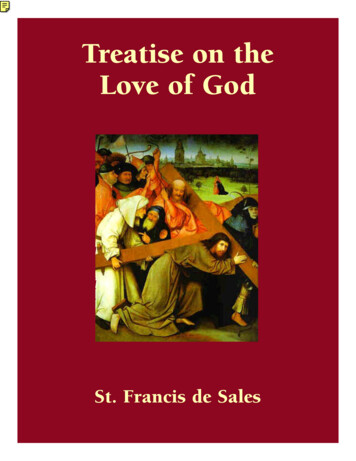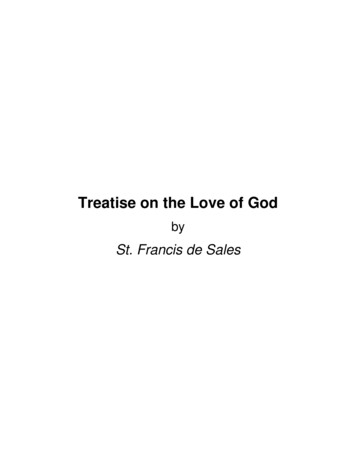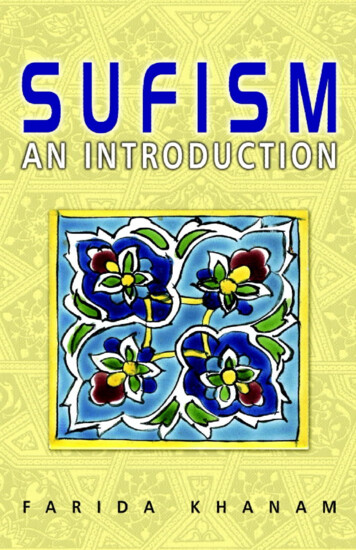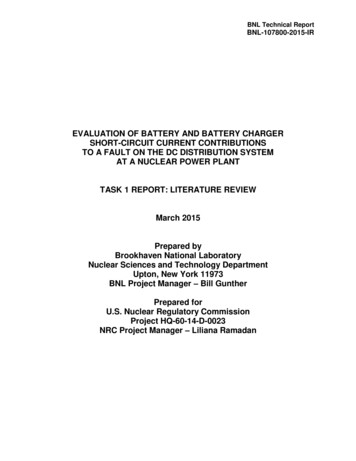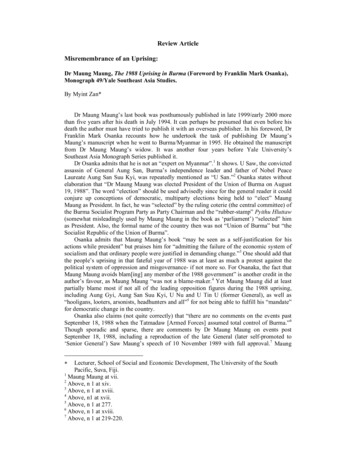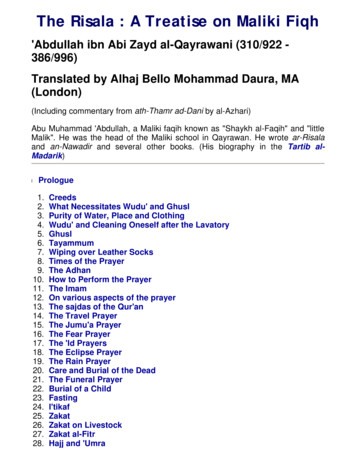
Transcription
The Risala : A Treatise on Maliki Fiqh'Abdullah ibn Abi Zayd al-Qayrawani (310/922 386/996)Translated by Alhaj Bello Mohammad Daura, MA(London)(Including commentary from ath-Thamr ad-Dani by al-Azhari)Abu Muhammad 'Abdullah, a Maliki faqih known as "Shaykh al-Faqih" and "littleMalik". He was the head of the Maliki school in Qayrawan. He wrote ar-Risalaand an-Nawadir and several other books. (His biography in the Tartib What Necessitates Wudu' and GhuslPurity of Water, Place and ClothingWudu' and Cleaning Oneself after the LavatoryGhuslTayammumWiping over Leather SocksTimes of the PrayerThe AdhanHow to Perform the PrayerThe ImamOn various aspects of the prayerThe sajdas of the Qur'anThe Travel PrayerThe Jumu'a PrayerThe Fear PrayerThe 'Id PrayersThe Eclipse PrayerThe Rain PrayerCare and Burial of the DeadThe Funeral PrayerBurial of a ChildFastingI'tikafZakatZakat on LivestockZakat al-FitrHajj and 'Umra
.Sacrifices, Slaughter of Animals, 'Aqiqa, HuntingJihadOaths and VowsMarriage & Divorce'Idda and MaintenanceSalesWills and Setting slaves freePre-emption, gifts, alms, endowment, pledge, loan, trust, an article orthing found, and compulsion.Homicide cases and other judgements.Judgement and Evidence.Inheritance.Summarising some aspects of prayer etc.Good Manners, Circumcision, shaving of hair, dressing and suchthings.Food and Drink.Greetings, permission to enter house, confiding in a friend, reciting theQur'an, supplication (du'a), remembrance of Allah, and what to dowhen embarking on a journey.Treatment, a mention of incantation, the evil eye, astrology, castration,tattoo, mention of dogs, and leniency to slaves.Dreams, yawning, sneezing, chess, horse-racing, shooting and othersuch things.(The translation here is not intended to be the final version, but it is hoped that itwill be of some use to those looking for texts on Maliki fiqh.)
Ibn Abi Zayd al-Qayrawani(310/922 - 386/996)The author of ar-RisalaAbu Muhammad 'Abdullah ibn Abi Zayd was one of the people North Africa. AbuZayd's name was 'Abdu'r-Rahman according to Ibn Makula and Qadi Ibn alHadhdha'. He was from the tribe of Nifza and lived in Qayrawan.His position in knowledgeHe was the Imam of the Malikis in his time and their model. He had acomprehensive grasp of the school of Malik and explained his statements. Hehad extensive knowledge and a prodiguous memory and transmission. His booksare ample testimony of that. His writing was fluent, clarifying and defining whathe said. He defended the school of Malik and established evidence in its support.He knew how to refute the people of sects. In addition to his writing, he was veryrighteous, scrupulousness and chastity. He obtained leadership in the deen andthis world. and people from all regions travelled to visit him. His companionswere noble and many people took knowledge from him. He composed asummary of the school and undertook to spread it and defend it. His books filledthe lands and were well-known to most of its people.Ash-Shirazi said, "He was known as 'little Malik'. Abu'l-Hasan al-Qabisimentioned him and said that he was a reliable imam in his perception andtransmission. Abu'l-Hasan 'Ali ibn 'Abdullah al-Qattan said, 'I did not imitate AbuMuhammad ibn Abi Zayd until I saw as-Saba'i imitated him.'"Abu Bakr ibn at-Tayyib mentioned him in his book, and esteemed his value andmerit. The same was true among other scholars in the east. Ibn Mujahid alBaghdadi and other Baghadadi companions of him asked him for an ijaza.Abu 'Abdullah al-Mayruqi said "He possessed knowledge, scrupulousness,excellence and intellect. He is too famous to need to be mentioned."Ad-Da'udi said, "He was quick to follow the truth. He studied fiqh with the fuqaha'of his land and listened to its shaykhs. He relied on Abu Bakr ibn al-Lubbad andAbu'l-Fadl al-Mumsi, and also studied wtih Muhammad ibn Masrur al-'Assal,'Abdullah ibn Masrur ibn al-Hajjam, al-Qattan, al-Ibyyani, Ziyad ibn Musa, Sa'dunal-Khawlani, Abu'l-'Arab. Abu Ahmad ibn Abi Sa'id, Habib, the client of Ibn AbiSulayman, and others. He travelled and went on hajj and listened to Ibn al-A'rabi,Ibrahim ibn Muhammad ibn al-Mundhir, Abu 'Ali ibn Abi Hilal, and Ahmad ibnIbrahim ibn Hammad the Qadi. He also listened to al-Hasan ibn Badr,Muhammad ibn al-Fath, al-Hasan ibn Nasr as-Susi, Darras ibn Isma'il, 'Uthmanibn Sa'id al-Gharabuli, Habib ibn Abi Habib al-Jazari and others. Ibn Sha'ban, alAburri and al-Marwazi asked him for an ijaza. Many people listened to him and a
lot of people learned fiqh with him. His adherents in Qayrawan included Abu Bakribn 'Abdu'r-Rahman, Abu'l-Qasim al-Baradha'i, al-Lubaydi, the sons of al-Ajdabi,Abu 'Abdullah al-Khawwas, and Abu Muhammad al-Makki al-Muqri'.The people of Andalusia who followed him include Abu Bakr ibn Mawhab alMaqburi, Abu 'Abdullah ibn al-Hadhdha' and Abu Marwan al-Qanazi'i. The peopleof Ceuta include Abu 'Abdu'r-Rahman ibn al-'Ajuz, Abu Muhammad ibn Ghalib,and Khalaf ibn Nasr. The people of the Maghrib include Abu 'Ali ibn Amdakatuas-Sijilmasi.His booksHe has the Kitab an-Nawadir wa'z-Ziyadat 'ala'l-Mudawwana which is famousand has more than a hundred sections, and the famous Mukhtasar (Summary) ofthe Mudawwana. Instruction in fiqh in the Maghrib is founded on these twobooks.He also wrote a revision of the 'Utibiyya, The Imitation of the People of Madina,The Defence of the School of Madina, the famous Risala, the Kitab an-Tanbih onthe position of the children of apostates, Waqfs for the Children of Notables,Explanation of the Times of the Prayer, Trust and Reliance on Allah, The Book ofGnosis and Certainty, Insurance of Provision, Kitab al-Manasik, a treatise onthose who are moved by the recitation of the Qur'an and dhikr, a book on TurningAway the Beggar, the Protection of the Reputation of the Believer, Kitab al-Bayanon the inimitability of the Qur'an, Kitab al-Wasawis, a treatise on giving relativessome of the zakat, a treatise prohibiting argumentation, a treatise refuting theQadariyya and rebuttal to the treatise of al-Baghdadi al-Mu'tazili, the Kitab alIstizhar on the refutation of the conceptualists [fikriya], Removal of Uncertainty onthe same topic, Book of Admonition and Counsel, Treatise on the Seeker ofKnowledge, The Excellence of Praying at Night in Ramadan, Excellent Warningfor the People of Truthfulness, a letter to the people of Sijilmasa on recitation ofthe Qur'an, and a treatise on the fundamentals of tawhid. All of his books arebeneficial and extraordinary and full of knowledge.It is mentioned that one day he went to visit Abu Sa'id, the nephew of Hisham,and found his gathering in session. Abu Sa'id said to him, "I have heard that youhave written books." "Yes," he replied, "may Allah make you prosper!" He said,"Listen to a problem." Abu Muhammad told him, "Mention it, may Allah make youprosper. If I am correct, you will tell me. If I am wrong, you will teach us." AbuSa'id was silent and did not do that again.The rest of his reportsAbu Muhammad was one of the people of righteousness, scrupulousness andexcellence. It is reported that he got up one night to do wudu' and poured waterfrom the jug into the vessel and spilled it. Then he poured it again and spilled it.Then that happened a third time and he had some doubts and remarked, "Youare recalcitrant towards us." He heard someone he could not see say, "The child
wet the bed over the jug and we disliked for you to do wudu' from it."When he wrote his books about the conceptualists and criticised the book of'Abdu'r-Rahman as-Siqilli in al-Kashf and al-Istizhar and refuted a lot of what theyhad transmitted regarding miracles (kharq al-'adat) according to what wasaffirmed in his book, the false Sufis and a lot of the people of hadith objected tothat and spread it about that he denied miracles (karamat), which he did not do.Indeed, at the beginning of his book, he articulates his aim, which is to refute acertain group of people found in in Andalusia and the east. Many well-knownbooks have been written on that, including the books of Abu'l-Hasan ibn Jahdamal-Hamdani, Abu Bakr al-Baqillani, Abu 'Abdu'r-Rahman ibn Shaqq al-Layl, Abu'Umar at-Talamanki and others. The most correctly guided of them in that andhad the best knowledge of his aim and its worth was the Imam of his time, QadiAbu Bakr ibn at-Tayyib al-Baqillani. He made his aim clear.Al-Ajdabi said, "I was sitting with Abu Muhammad when Abu'l-Qasim 'Abdu'rRahman ibn 'Abdu'l-Mu'min the mutakallim was with him. A man asked themabout al-Khidr and whether it could he said that he was still in this world in spiteof all this time and would die until the Final Hour comes and whether this isrefuted by the words of the Almghty, 'We did not give any human being beforeyou immortality.' (21:34) They both replied to him that that was possible andpermitted and al-Khidr could live until the Final Trumpet was blown. Immortality isconnected to remaining as long as the Next World remains, and remaining untilthe Trumpet is blown is not immortality. Do you not see that Iblis - may Allahcurse him - is not immortal, but he is one of those deferred until the Day of aKnown Time.It is mentioned that Abu Muhammad wrote to Abu Bakr al-Aburri:Hearts refuse the hearts of a peoplewhen they have no portion with them.But selves choose selveswhile they have no portion with them.That is only because of secretsknown by the All-Watchful Witness.Abu'l-Qasim al-Lubaydi said, "'Isa ibn Thabit al-ÔAbid met Shaykh AbuMuhammad and they wept a lot together and admonished one another. When hewanted to leave, 'Isa said to him, 'I want you to write my name on the carpetunder you. When you see it, you can make supplication for me. Abu Muhammadwept and said to him, 'Allah Almighty says, "All good words rise to Him and Heraises up all righteous deeds." (35:10) Let me make supplication for you, butwhere are the righeous deeds to elevate it?'"His death
Abu Muhammad ibn Abi Zayd died in 386 and was elegised by a lot of the writersof Qayrawan who composed a number of moving elegies about him.It is mentioned that Abu Muhammad was seen in his assembly reflecting insorrow and he was asked what the reason for that. He replied, "I dreamt that thedoor of my house had fallen down. Al-Kirmani says that it indicates the death ofthe owner of the house." He was asked, "Is al-Kirmani considered to be like Malikin his science?" "Yes," he replied, "In his science, he is like Malik is in hisknowledge." It was not long after that that he died, may Allah have mercy on him.
In the name of Allah, the Merciful, the Compassionate.May Allah bless our Master Muhammad and his family and Companions and givehim peace.Abu Muhammad 'Abdullah ibn Abi Zayd al-Qayrawani, may Allah be pleased withhim and make him pleased, says:IBN ABI'S ZAYD'S PROLOGUEPraise be to Allah who begins the creation of man as a blessing from Him andfashions him in the womb by His wisdom and brings him out into His tender careand to the provision He eases him to and teaches him what he did not know "Allah's bounty upon him is ever great."Allah makes him aware of Himself through the signs in what He has made andhas left no excuse for him by virtue of what His Messengers, the best of Hiscreation, have brought. He guides in His generosity, those whom He has grantedsuccess and He leads astray, in His justice, those for whom He has decreeddebasement. He eases the believers to ease in both the worlds and opens theirhearts to the Reminder. So they believe in Allah, pronouncing this belief with theirtongues, being sincere about it in their hearts and acting according to what hascome down to them through His Messengers and His Books. They learn what Heteaches them and keep within the limits He has prescribed for them. They arehappy with what He has made halal for them and avoid what He has madeharam for them.May Allah assist both us and you in taking care of what He has entrusted us withand in holding to His Shari'a. You have asked me to write a short treatise for youabout what is obligatory in the dîn - those things which should be pronounced bythe tongue and believed by the heart and done by the limbs; and about thosesunnas which are associated with these obligatory actions - the confirmed(mu'akkada), the optional (nafila) and the desirable (raghiba); something aboutthe courtesies (adab) associated with them; along with certain of the keyprinciples and derived judgements in jurisprudence (fiqh) according to the madhhab and way of Imam Malik ibn Anas, may Allah have mercy on him; and inaddition to mention what the great men of knowledge and fiqh have said aboutunclear matters in the madh-hab in order to make them easier to understand.You have made this request because of your desire to teach these things tochildren in the same way that you teach them how to read the Qur'an so that theymay first of all gain an understanding of the deen of Allah and His Shari'a in theirhearts, which will hopefully bring them blessing and a good end result.I have responded to this out of the same hope of gaining for both myself and yousomething of the reward of those who teach the deen of Allah or call to it.Know that the best of hearts is the one which contains the most good and those
hearts which are most likely to gain good are the ones which no evil has beenable to get into. The thing that the people of advice are most concerned aboutand which those who desire its reward most want is to put good into the hearts ofthe children of the believers so that it becomes firmly established in them; and tomake them realise what the bases of the deen and the limits of the ShariÔa arein order that they may be satisfied with that and to make them realise thosethings in the dîn which their hearts have to accept and their limbs are required todo.It is related that teaching the Book of Allah to young children extinguishes theanger of Allah and also that teaching something to someone in their childhood islike engraving it on stone.I have made these things clear and if Allah wills they will get benefit from learningthem, nobility from knowing them and happiness from believing them and actingaccording to them.It has come down to us that children should be ordered to do the prayer at sevenyears old and beaten for not doing it at ten years old and be separated in theirbeds. Similarly, they should be taught before they reach puberty those words andactions which Allah has made obligatory for people so that when they reachpuberty these things are fixed in their hearts and they are at ease with them andtheir limbs are used to doing them. For Allah has made certain beliefs obligatoryfor the heart and certain acts of obedience obligatory for the limbs.I will arrange what I have undertaken to talk about in chapters so that it will beeasier, if Allah wills, for those who are studying it to understand. It is Him we askfor guidance and Him we ask for help. And there is no power nor strength exceptby Allah, the High, the Mighty. May Allah bless our Master Muhammad, HisProphet, and his family and Companions and grant them much peace.
CHAPTER 1: CREEDSThe obligatory matters of the deen that the tongue should give expression to andin which the heart should believe.This chapter clarifies what should be expressed in words and what hearts shouldbelieve. It contains about a hundred items of creed, which can be divided intothree basic categories: that which must be believed about Allah Almighty, thatwhich is impossible in respect of Allah, and that which is permissible in respect ofHim.These are matters which all those who are legally responsible must believe.1.1 Beliefs regarding Allah1.1a Tawhid -His Oneness and Disconnection from creatures (tanzih)These obligatory tenets include believing in the heart and expressing withthe tongue that Allah is One God with no god other than Him, nor anylikeness to Him, nor any equal to Him.[Belief is expressed on the tongue and confirmed by sincerity in the heart andaction with the limbs. Thus it is composed of all three aspects. Nonetheless,simple belief in the Oneness of Allah will save a person from being in the Fire forall eternity.The belief that Allah is One is the fundamental basis of Islam, and when DivineUnity is expressed, the name "Allah" must be used. It is not permissible to say,"There is no god but the Almighty" or use any other names except Allah. Nothingat all resembles Him or is equal to Him.][Al-Kalbi mentions that the clear evidence for this is found in four ayats: "If therehad been any gods except Allah in heaven or earth, they would both beruined" (21:22); "Say: 'If there had been other gods together with Him as you say,they would have sought a way to the Master of the Throne'" (17:42); "Allah hasno son and there is no other god accompanying Him, for then each god wouldhave gone off with what he created and one of them would have been exaltedabove the other" (23:91); and "But they have adopted gods apart from Him whichdo not create anything. They are themselves created." (25:3)1.1b. Lack of AssociatesHe has had no child. He had no father. He has no wife. He has no partner.[See Qur'an 112: "Say: He is Allah, One with no other, Allah the EverlastingSustainer of all. He has not given birth and was not born and there is no one isequal to Him," and"And say: 'Praise be to Allah Who has had no son and Whohas no partner in His Kingdom and Who needs no one to protect Him from
abasement.'" (17:111)He is totally unique. If he were to have a wife or partner, that would imply need,and He is absolutely beyond need.]1.1c. Lack of TemporalityThere is no beginning to His firstness nor any end to His lastness.[His existence does not begin with firstness so that there is a point at which Hecould be said to begin nor does He have a point at which He could be said toend. He exists eternally, out of time, before time and after time.]1.1d. Ineffablity and IndefinablityThose who try to describe Him can never adequately do so nor canthinkers encompass Him in their thought. Real thinkers may derive lessonsfrom His signs but do not try to think about the nature of His Essence. "Butthey do not attain any of His knowledge except what He wills." (2:254)[ It is impossible to grasp His true description, let alone His Essence. Thinkersmust learn through the Signs which indicate the splendour of His Power, butmust not attempt to reflect on the nature of His Essence because the Prophetsaid, "Reflect on His creation, but do not reflect on His Essence."]1.1e. His Footstool"His Footstool embraces the heavens and the earth, and their preservationdoes not tire Him. He is the Most High, the Magnificent" (2:254)[ He has full control and authority over all creation, high and low, and Hispreservation of them is no burden for Him.]1.1g. His AttributesThe All-Knower and the All-Aware, the Arranger and the All-Powerful. TheAll-Hearer and the All-Seeing. The High and the Great. He is over HisGlorious Throne by His Essence.[ He has knowledge of all things, and complete power and authority over allthings. His hearing and vision is connected to all things in existence.]1.1g. His knowledgeHe is everywhere by His knowledge. He created man and He knows whathis self whispers to him and He is nearer to him than his jugular vein. Noleaf falls without him knowing of it nor is there any seed in the darkness ofthe earth, nor any fresh thing nor any dry thing, that is not in a clear book.
[He knows our inner dialogue and thoughts. He is closer to man that his jugularvein, which is his physical body, and so He is closer to man than his ownphysicality. "We created man and We know what his own self whispers to him,and We are nearer to him than his jugular vein." (50:16) In addition to theuniversal scope of His knowledge, He knows the precise details, like eachindividual leaf which falls – and it only falls by His will and in accordance with Hisknowledge. Everything is encompassed by His knowledge, dead or alive,growing or dormant. "The keys of the Unseen are in His possession. No oneknows them except for Him. He knows everything in the land and sea. Not a leaffalls without His knowing it. There is no seed in the darkness of the earth, and nowet thing or dry thing, but that it is in a Clear Book." (6:59)]1.1h. Mastery over all creationHe is firmly established on His throne and has absolute control over Hiskingdom.[No one knows the true interpretation of this expression. Imam Malik was askedabout it and said, "'Firmly established' is known but 'how' is not known." Nothingis hidden from Him and His control is absolute. "He then established Himselffirmly on the Throne." (10:3, etc.)]1.1i. His Names and Attributes[He has the most beautiful names and the most sublime attributes and He hasalways had all these names and attributes. He is exalted above any of Hisattributes ever having been created or any of His names having been broughtinto temporal existence.He is described by the best and noblest of the meanings of His Names. He hasattributes like power, will, height, and so forth. He is high exalted over anyimperfection or lack. These Names have always been His and will remain His.Thus neither His names nor His attributes are created. They are simply His. "ToAllah belong the Most Beautiful Names" (7:180)]1.1j. His Speech and ManifestationHe spoke to Musa with His speech which is an attribute of His essence andnot something created. He manifested Himself to the mountain and itdisintegrated through exposure to His majesty.[ Allah spoke to Musa with His timeless words and Musa actually heard Histimeless speech."When Musa came to Our appointed time and his Lord spoke tohim, he said, 'My Lord, show me Yourself so that I may look at You!' He said,'You will not see Me, but look at the mountain. If it remains firm in its place, thenyou will see Me.' But when His Lord manifested Himself to the mountain, Hecrushed it flat and Musa fell unconscious to the ground." (7:143)]1.2 Belief in the Qur'an
The Qur'an is the speech of Allah, not something created which musttherefore die out, nor the attribute of something created which musttherefore come to an end.[ The Qur'an is the speech of Allah which is not created and is timeless, outsideof temporal time. Hence it will not end as creatures must end, but will abideendlessly.]1.3 Belief in the Decree (Qadar)1.3a. The Prior Decree of Good and EvilAlso included is belief in the Decree both the good of it and the evil of it,the sweet of it and the bitter of it. All of this has been decreed by Allah, ourLord. The way things are decided is entirely in His hand and the way theyhappen is according to His decree. He knows all things before they comeinto existence and they take place in the way He has already decided.[It is necessary to believe that all things, good and evil, are decreed by Allah andnothing escapes His will and thus only what He wills occurs in His kingdom. Allthings and their being brought into existence from the concealment of nonexistence to the domain of manifestation in their myriad aspects and forms – longand short, at one time rather than one, in one place rather than another. All ofthat occurs and issues directly from His Decree according to His knowledge anddependant on His will.]1.3b. Prior KnowledgeThere is nothing that His servants say or do which He has not decreed anddoes not have knowledge of. "Does not He who creates know, when He isthe Subtle and the Aware." (67:14)[He knows everything which happens before it happens. It only occurs inaccordance with His knowledge of it.]1.3c. The Prior Predisposition of PeopleHe leads astrays whoever He wills and in His justice debases them and Heguides whoever He wills and in His generosity grants them success. In thatway everyone is eased by Him to what He already has knowledge of andhas previously decreed as to whether they are to be among the fortunate orthe miserable.[ Every man has prior disposition to what Allah already knows about him beinghappy or wretched because Allah only created man according to His knowledge.See Qur'an 14:4, 3:160, etc.]1.3d. Exaltedness of Allah's power
He is exalted above there being anything He does not desire in Hiskingdom, or that there should be anything not dependant on Him, or thatthere should be any creator of anything other than Him, the Lord of allpeople, the Lord of their actions, the One who decrees their movementsand the time of their death.[ The power of Allah is so immense and vast that there is nothing which is notdirectly under his authority and subject to His will. All things - might andabasement, wealth and poverty, pious actions and all things are subject to Hiswill and power.]1.4 Belief in the Messengers and Muhammad1.4a. The sending of MessengersHe has sent Messengers to them in order that they should have noargument against Him.[The first of the Prophets was Adam and the last was Muhammad, may Allahbless him and grant him peace. One must believe and accept that Allah sent theMessengers to those who are legally responsible, i.e adult and sane, and theyconveyed the Message. The wisdom of sending the Messengers is that itremoves any excuse which creatures might offer about not having heard theMessage.]1. 4b. The Final MessengerHe sealed this Messengership, warning, and Prophethood with his ProphetMuhammad, may Allah bless him and grant him peace, whom He made thelast of the Messengers - "A bringer of good news and a warner, calling toAllah by His permission and an illuminating lamp."[Revelation, which is warning and prophethood, which is informing about whatAllah has said, reaches its end with the Prophet Muhammad. There will be noProphets after him. He brings the good news that whoever follows him will behappy and whoever does not will be punished. He calls to Allah, conveyingtawhid to the legally responsible, and fighting the unbelievers. He is anilluminating light because his Shari'a is a light which guides the bewildered –whoever follows it and proceeds along the Straight Path will emerge from thedarkness of disbelief to the light of belief.]1.4c. Divine Guidance through the BookHe sent down on him His Wise Book and by means of him He explained hisupright deen and guided people to the Straight Path.[ One must believe and affirm that Allah revealed to His Prophet Muhammad aBook containing judgement and wisdom to which no falsehood at all comes.Allah opened and expanded the Straight deen of Islam through His Prophet.
Thus He manifests its judgements and clarifies it on the tongue of His Prophet.Allah only sent down the revelation to us so that it would be clear to people. Theguidance of Muhammad is the sun of knowledges, the source of right guidanceand the fount of certainty which guides people to the Straight Path.]1.5. Belief in the Resurrection and Judgement1.5a. The Last HourAlso part of what must be believed is that the Hour is coming - there is nodoubt about it .[Cf. 40:59.This must be confirmed and believed and the one who denies that theFinal Hour will come is an unbeliever. However, but only the All-Knower of theUnseen knows when it will come. ]1.5b. Resurrection of the DeadIt must be believed that Allah will raise up all who have died: "As Hebrought them into existence the first time so they will be brought backagain;"[ It must be believed that He will bring the dead back to life after they were deadand bring them back for the Gathering. There is no disagreement amongMuslims that it will occur, but there is disagreement about whether He will bringthem back from absolutely nothing or from dissolution through a reconstituion oftheir parts.]1.5c. Divine Reward: Multiplication of Good ActionsIt must be believed that Allah, glory be to Him, multiplies the reward of thegood actions of His believing servants.[ It must be believed that Allah will multiply good actions for the believersaccording to sincerity and degrees of humility, so that multiplication can be fromten to 700, in other words, a great deal. Ibn Hanbal transmitted that Allahmultiplies the good action a thousand thousand times. This means the reward fordoing them. The "good action" is what is praised in the ShariÔa, and what is theopposite of that is a "bad action", which is what the ShariÔa considersreprehensible.]1.5d. Pardoning Wrong ActionsHe pardons them for their major wrong actions by virtue of theirrepentance (tawba) and forgives them for their minor wrong actions byvirtue of their avoidance of the major wrong actions.[Part of His bounty to His believing servants is that if anyone does any majorwrong actions and then repents and makes amends, He will pardon Him by His
favour and generosity. Small wrong actions are expiated by avoiding majorones.]1.5e. Those who do not repent are subject to His willThose who do not repent of their major wrong actions become subject toHis will. "He does not forgive anything being associated with Him, but Heforgives anything other than that to whoever He wills."[ Those believers who commit major wrong actions and die without repenting ofthem are subject to the Will of Allah. If He wishes, He will forgive them out of Hisfavour. If He wishes, He will punish them out of justice. He may forgiveeverything except for associating others with Him.]1.5f. Deliverance from the Fire because of beliefThose He punishes with His Fire, He will remove from it because of anybelief they have and by this He will cause them to enter His Garden."Whoever does an atom's weight of good will see it." (99:7)[ It must also be accepted that if Allah wills that the rebels among the believersbe punished in the Abode of Punishment, their punishment will be commensuratewith what they have brought on themselves by their evil deeds and then mercywill envelop them and they will emerge from the Abode of Punishment and enterthe Abode of Peace. Whoever has the weight of atom of belie
Times of the Prayer 9. The Adhan 10. How to Perform the Prayer 11. The Imam 12. On various aspects of the prayer 13. The sajdas of the Qur'an 14. The Travel Prayer 15. The Jumu'a Prayer 16. The Fear Prayer 17. The 'Id Prayers 18. The Eclipse Prayer 19. The Rain Prayer 20. Care and Burial of the Dead 21. The

